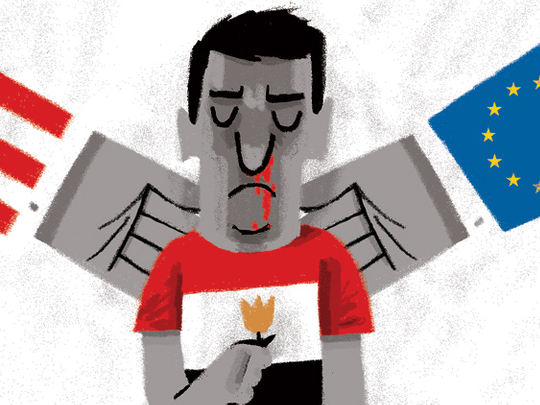
If you are going to intervene in a foreign country, it helps to know what you want to happen. But on Egypt — and Syria, too — western policy is buffeted by a mass of conflicting instincts. The US and the European Union (EU) are pro-democracy but anti-Islamist; pro-stability but anti-crackdown; opposed both to jihadists and to their enemies in the security state. No wonder that the Arab world is confused. The one thing that unites the Egyptian military and the Muslim Brotherhood is that they both claim to have been betrayed by the US.
If America and its European allies are to frame a coherent response to the tragedy in Egypt, they urgently need to clarify their goals.
Listing those goals in no particular order is relatively easy: End bloodshed, restore stability, fight terrorism, promote political freedom, keep consciences clean, preserve alliances, stabilise economies, prevent a war with Israel and stop new regional conflicts. In the heady days of the Arab spring, it was possible to believe that a single policy — supporting the spread of democracy — ticked all these boxes. The new democracies would be more prosperous, more peaceful and more pro-western. The roots of terrorism would wither away.
But this new golden age has failed to materialise. Instead, two-and-a-half years after the fall of president Hosni Mubarak, we have massacres on the streets of Egypt, a civil war in Syria, the resurgence of Al Qaida in Iraq and an arc of instability that stretches from Tunisia to the Gulf. Economies are collapsing, conflict is spreading and the anarchic conditions that favour the spread of terrorism are flourishing.
Faced with this grim reality, the US and the EU have to decide which of their many conflicting goals to prioritise. Sticking with a policy that puts the promotion of democracy at the heart of policy towards Egypt looks tempting. It allows policy to be based on a consistent principle that can be applied across the region. It feels morally better. And it offers an optimistic long-term vision for the future of the Middle East.
The trouble is that calling for a restoration of democracy in Egypt now is both unrealistic and, in the short term, dangerous. It is unrealistic because the military is clearly engaged in a fight-to-the-finish with the Muslim Brothers. It is simply not going to allow them back into the political system in a meaningful fashion. Even cutting off US aid to the military will not force a change of heart, since the Saudis are more than willing to fill the gap. Furthermore, as many Egyptian liberals have now concluded, returning an unreformed Muslim Brotherhood to power would pose a different sort of threat to democracy.
It would also be dangerous to press for fresh elections at present. Can you imagine those elections being conducted in a peaceful atmosphere, with the losers calmly agreeing to respect the results?
For the moment, the restoration of stability must be a higher priority than a return to the ballot box. Political repression and the denial of freedom are horrible to behold. But civil war is even worse. Just ask the long-suffering people of Syria, where 100,000 people may have died and millions have become refugees. A prolonged period of violent chaos in Egypt is also the most dangerous scenario for western interests, since that would provide the perfect breeding ground for terrorism. With Syria, Libya and Yemen already in a flux, the last thing that anybody needs is for Egypt — the Arab world’s largest state — also to collapse into bloody anarchy.
The best route away from civil war is a negotiated political settlement. However, with the Brotherhood and the army at each other’s throats, that option has all but disappeared. If peaceful agreement cannot stop civil strife, the only other way is for one side to win — and in Egypt the military have the upper hand.
Rather than pressing the military for a swift return to democracy, the US and the EU should now adopt a fallback position that emphasises the protection of human rights and the restoration of clean government. Even those goals will be very hard to achieve. Egypt’s military ignored pleas from Washington not to use indiscriminate force on the streets of Cairo. The obvious threat now is that the government will resort to the traditional playbook of an Arab autocracy, from Bashar Al Assad to Saddam Hussain, involving torture and “disappearances”. But it is still possible — if the West preserves some sort of relationship with the military — that these worst excesses can be avoided.
If the edge can be taken off repression in Egypt, then the next step would be to work with the government to try to revive the economy — and to prevent the country’s descent into a militarised kleptocracy. Clean government and a return to growth can restore some legitimacy to the political system. If order and economic growth return then there is a chance that the kind of civil society institutions that are necessary for a democracy to survive and flourish — independent courts, a free media, better schools — can take root in the country.
When Egypt eventually starts moving back towards democracy, it will have to manage the process better than it has since 2011. In particular, it will be vital to write a constitution that protects minority rights and civil liberties — before staging elections. Political forces other than the Muslim Brotherhood will also have to be given more time to organise.
All of this could be a long process. It took 17 years for Chile to restore democracy after General Augusto Pinochet’s coup in 1973. With luck, Egypt will not have to wait so long.
— Financial Times












